IT IS A LUCKY MOTORIST who has never returned to his/her vehicle to discover a ticket taped to the windscreen advising that he/she has contravened a parking regulation and has been issued with a fine.
Some of these can be quite hefty (for parking in a Clearway, for example) but as councils looks for more ways to increase revenue, none is ever cheap. And operators of private car parks are increasingly issuing parking tickets.
So, just how legal and enforceable are parking fines?
There are three main types of parking areas, so the first thing to define is where you have parked:
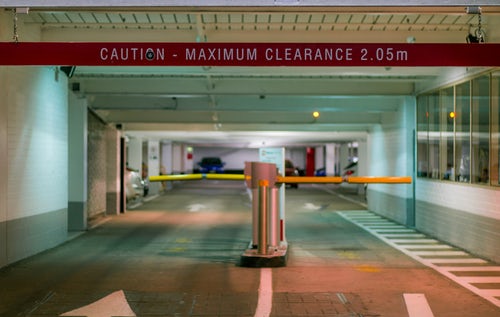
Private Car Parks
Off-street parking complexes such as will be found in most CBDs are privately operated. Normally, you collect a ticket on entry and then pay before you leave. In some cases, you can pre-pay online.
But what happens if you unintentionally (or intentionally) park in a reserved space or some other space within the parking station where parking is not allowed, or overstay the maximum time allowed? Technically and legally, the operator of a private car park cannot actually fine you for any reason – the law reserves that right for governments. To get around this, private operators argue that by agreeing to the “conditions of entry” (which they claim you do by driving past a sign as you enter, or by accepting the parking ticket that has conditions of entry printed on the back) you have entered into a contract and agreed to abide by their regulations. If you contravene these rules, the operators could try to get compensation for “breach of contract”.
That sounds like an awfully big title for a simple breach of parking rules.
The problem arises when private car park operators leave a “Notice of Claim” on the offending vehicle. These have been deliberately and cunningly designed to look very much like a parking ticket. They are not.
Confusing the issue further, the amounts they claim are not controlled under any legislation, so operators have taken to demanding varied and ever-increasing amounts. Failure to pay these demands often results in rapidly escalating penalties and ever-increasing threats of legal action and/or debt collection – enough to frighten even the strongest of people. However, various court cases have been fought and won on the basis that the amount of the penalty fare exceeds any “loss” suffered by the operator as a result of the breach (which in the first instance is nothing more than determining ownership of the vehicle and the cost of issuing a penalty notice).

Private Parking Areas
Okay, we’ve established that a private car park owner cannot fine you, but they can (and often do) enter into an agreement with local councils to police the area and issue fines on their behalf. This is often the situation in major suburban shopping centres, where, even though it’s technically a “private” parking area, council parking inspectors are out and about and issuing tickets.
The way to distinguish these parking areas from the aforementioned “private” car parks is to look for a sign at the entrance stating that this is a “Private Parking Area”. In the absence of such a sign, you cannot be fined unless you park in a disabled space.
If you do receive a notice of a fine, take a good look at the ticket. If it is issued by a council, it should clearly say so and your payment should be made through them. If it doesn’t state that it has been issued by a council or asks you to make a payment to a private company, refer back to the previous paragraphs.
If you receive a parking fine in a Private Parking Area and believe it is incorrect, you can lodge a dispute through the relevant council. To do this, call the council or visit their website – there’ll be instructions on how to lodge a dispute.
If you decide to lodge a dispute, you’ll need to explain why you shouldn’t be fined and provide evidence to back up your claim. Make sure you lodge your dispute in writing prior to the due date on the ticket, but before paying. Once you’ve paid, a dispute can’t be heard, and if the due date has passed, penalties will start being applied.
If you weren’t the driver at the time of the offence, fill out a Statutory Declaration to that effect and send it to the council. You will be required to name the driver.

Public Parking Areas
On-street parking is covered by the Australian Road Rules and there is a plethora of rules covering everything from obeying time limit signs to not parking too close to an intersection, and everything in between. There are as many fines and penalties as there are offences, and they vary from jurisdiction to jurisdiction, and penalty notices can be issued by local councils or the police.
Whenever you are issued with a parking ticket, inspect it carefully.
Details such as the registration number of your car, the location and the date and time on the ticket must be correct and accurate – it they aren’t, the ticket is invalid, so check. Also check that what you are being fined for is actually an infringement (there are so many variables about where and when you can park, it is not unusual for people to be penalised when they are actually parked legally). Read the sign post and if you are parked legally, photograph the sign. Check the ticket is actually for your car – less honest people have been known to take their own parking ticket and attach it to a nearby car, in the hope that the owner will pay it without actually checking that it is their car that was ticketed. Check that the parking signs are clearly visible and not obstructed (by a tree, for example) as this can be a defence.
If you feel you have been penalised wrongly, you can request a review. To do this, you’ll need to know who issued the ticket. If it was the police, you’ll need to lodge your dispute with them. Do this by completing a review form available online or by writing to the Expiation Notice Branch in your state. You’ll need to explain the reason why you think the ticket is wrong, and once reviewed, you’ll be notified of the decision by mail. If you weren’t the driver at the time, complete a Statutory Declaration to that effect and send it in with your review form. If the ticket was issued by a council, follow the directions in the previous paragraphs.
If you request a review from either a council or the police and it is not upheld, you still have the choice of having it heard by the Magistrates Court. In this case, you’ll need to elect to be prosecuted by following the instructions on the parking ticket.
Not to put too fine a point on it, but all of this sounds like a lot of bother to challenge a simple parking ticket, and the chances of having it overturned are not particularly high, although legitimate excuses such as a medical emergency or a mechanical breakdown may get you off (include supporting evidence such as photos, mechanical repair receipts or medical certificates).
And we love the story we heard about one enterprising (but law-breaking) driver who when ticketed for pay-and-display parking without a valid ticket on his dashboard, sidled up to the next car displaying a valid ticket, photographed it and returned the photo as supporting evidence in his claim against the fine. He got away with it, but defrauding state governments or local councils isn’t something we’d recommend. And it isn’t something you can do on a regular basis.
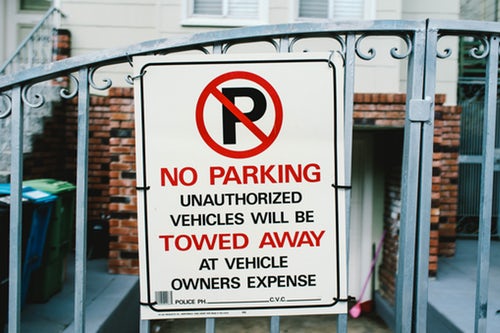
Should there be parking tickets at all?
Aussie Speeding Fines ( http://www.aussiespeedingfines.com/ ) argue (correctly) that parking fines have absolutely nothing to do with road safety and thus are purely a revenue raising issue. As they say in their book, for something to be a crime, there has to be a victim, and “there is clearly no victim if you overstay your spot at a parking meter by 5 minutes or stop in a No Standing Zone to drop someone off.”
They continue: “Our roads were originally created in ‘Fee Simple’. This means that we all have a right to use these roads for free – this includes the side of the road, where you might park your car.”
In addition, they point out that your automobile is defined as a “Light Vehicle” and there is no lawful requirement for privately owned and used vehicles to pay fees to use any public road, as per Section 92 of the Commonwealth Constitution (the Annotated version – Quick and Garran). And since local government is not recognised by the Australian Constitution, a council has no right to issue fines (although local councils are, in fact, recognised under state constitutions, so beware).
Another way in which the parking rules contravene the law is that parking meters do not comply with Section 10 of the National Measurement Act (this is one of the group’s major issues with speed guns, as well) making any penalty applied using information gained from them inadmissible.
Are parking penalties unreasonable?
While the size of some parking fines seems to be totally out of touch with the severity of the offence, the increasing use of draconian measures such as cancelling vehicle registration and driver’s licences for non-payment of parking fines is an area of real concern.
While nobody condones people ignoring legitimately issued penalties, cancelling a driver’s licence or vehicle registration is a certain recipe for putting more unlicensed drivers and unregistered vehicles on our streets. Assuming these miscreants even know they have been cancelled, far too many of them continue to drive, putting all of us at risk. Unlicensed drivers and unregistered vehicles are also uninsured. They are more likely to ignore road rules (“What more can they do to me?”) and to attempt to evade apprehension.
Quite simply, the threat of losing a licence to drive, or having a vehicle registration removed, is no deterrent at all to a small but significant proportion of road users.
I must be psychic.
Just three days after posting this story on parking fines, I returned to my car to find, you guessed it, a parking fine.
It appears I had parked next to a fire plug indicator and was duly issued with a $79 expiation notice by West Torrens Council. To be honest, I wouldn’t have known that this odd white tube was a fire plug indicator, but there you have it. And as we all know, ignorance is no defence (oddly enough, the tube is identical to one Telstra installed over one of their installations – definitely not a fire plug – on my property some years ago). In fact, I didn’t discover the notice until the next day so I went back to the location to check the facts. Now, as it happens, the fire plug indicator in question was positioned right behind a large tree (as you can see in the first image). The yellow line on the roadway was in poor repair, barely visible in daylight, much less in the pre-dawn darkness when I parked there and did not show up when using the reversing camera. And since I reversed into the parking space, the indicator was completely and utterly obscured by the tree. When I left my vehicle, I didn’t walk to the nearside or behind it, so still didn’t see the indicator (from the offside, the post was hidden behind the vehicle – a Lexus LX450d), and since the vehicle was parked over the yellow line, it too was invisible. Had I driven forwards into the parking space, I probably would have seen the white post (but I still wouldn’t have recognised it as a fire plug indicator).
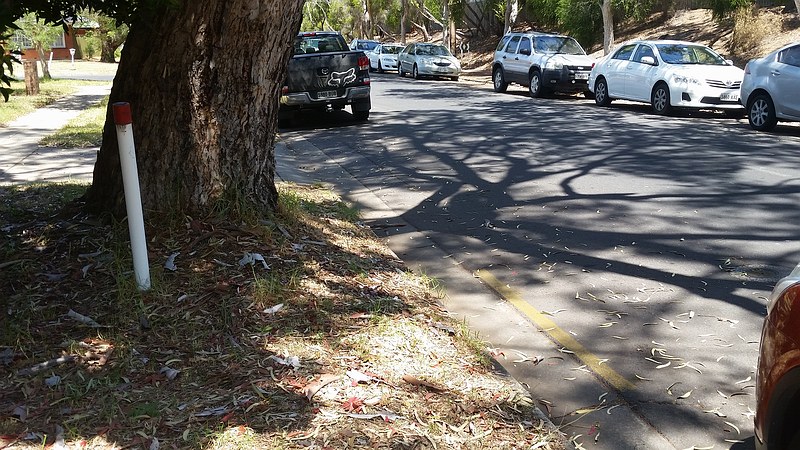
Following my own advice, I photographed the fire plug, the tree and the faded yellow line. I then went online and downloaded a form called “Review of a Council Decision (to expiate – parking and stopping offences), completed the form, stated my case and lodged it online with West Torrens Council. My submission is that since the fire plug indicator was completely obscured by the large tree, and the yellow line was not visible to human eye or reversing camera, the expiation notice should be cancelled.
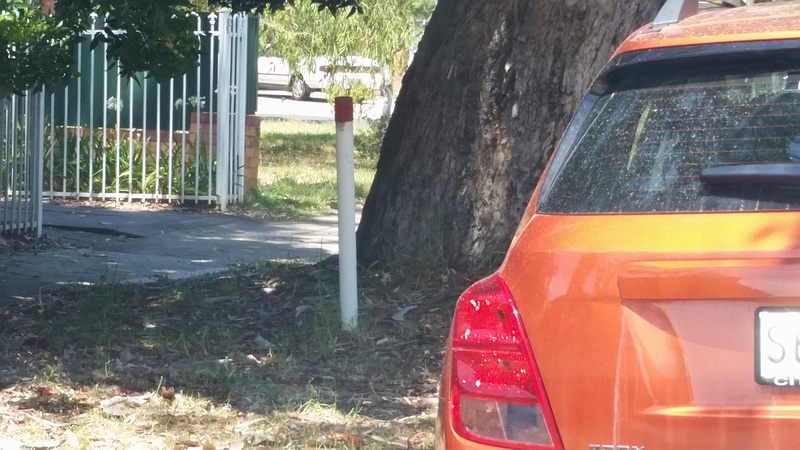
Apparently, I’m not the only person to lodge an appeal against a parking fine – the form suggests the review may take up to six weeks to complete. I asked for confirmation that no further action would be taken and no additional penalties would be applied until a judgement had been made and the email sent to me confirming receipt of my application said exactly that. So now we await developments.
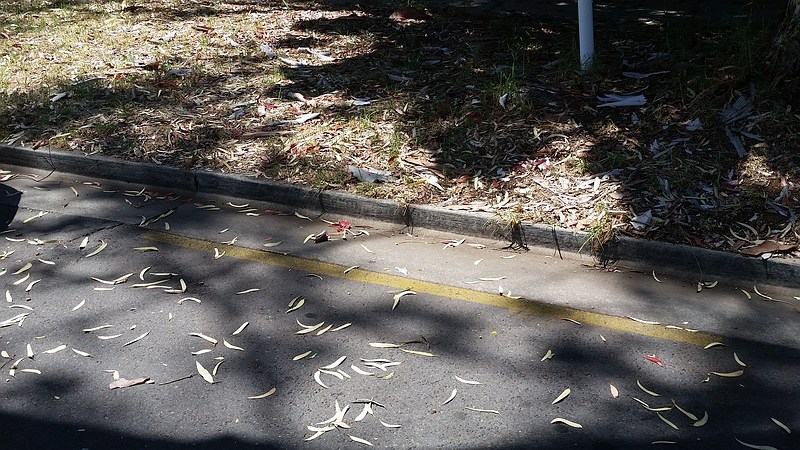
If my appeal is rejected, I may very well elect to be prosecuted and put my case in court, but we’ll wait and see. Meanwhile, I’ll keep you posted on developments.
I should have known writing a story on parking tickets was tempting fate!
UPDATE:
Following my appeal to West Torrens Council, I received a letter from them dated 28 February 2019. In it, they reiterate (correctly) that under Australian Road Rules, a vehicle must not stop within 1 metre of a fire hydrant, fire hydrant indicator or fire plug indicator. A driver must not leave a vehicle unattended (i.e. be within 3 metres of the vehicle) in these areas. They added an interesting rider: “Please also note there is no legal requirement for yellow lines to be situated around fire hydrant plugs, indicators or fire plug indicators.” They went on to state that a “full evaluation of (your) submission and relevant documentation surrounding the offence has been made. After consideration of all the circumstances, Council has withdrawn the expiation notice on this occasion and no further action will be taken in the matter.” This was followed by a warning, “please note it is unlikely that Council would extend similar leniency to you in the future if similar offences occur.” All in all, I consider that to be a reasonable and acceptable result, considering the circumstances. And now that I know what a fire plug indicator looks like, and that there’s one hiding behind that tree, I won’t be repeating my mistake. But more importantly for other unsuspecting parkers, I’ll be keeping an eye on the offending indicator to see if anything is done to make it more visible.
